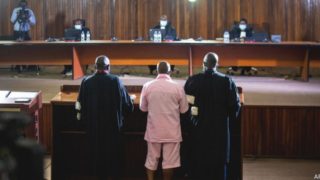ESKOM, SOUTH AFRICA’S state-owned electricity monopoly, is in crisis. So said Cyril Ramaphosa, the country’s president, in his annual “state of the nation” speech on February 7th. He was not exaggerating. Four days later cities were plunged into darkness as South Africa endured its biggest blackout ever. Some 40% of its total capacity was switched off, forcing mines and factories to close and all but the wealthiest to reach for candles. It was an undignified end to Mr Ramaphosa’s first year in office (see article).
South Africans had grown used to power cuts under his predecessor, Jacob Zuma, whose cronies looted and mismanaged nearly everything the state controls. Mr Zuma hollowed out institutions, appointed crooks and liars to senior jobs and ensured that the watchdogs who are supposed to stop corruption were muzzled. Some state-owned firms, such as Eskom and South African Airways, were bled so dry that their debts threaten the stability of South African banks and even the country’s credit rating. South Africans expect better from Mr Ramaphosa. Will he live up to his promises?
He has made a good start, cleaning out the boards of state-owned companies and appointing watchdogs with teeth and the inclination to use them. Shamila Batohi, a tough lawyer from the International Criminal Court in The Hague, recently started work as the country’s chief prosecutor. A judicial commission into allegations of “state capture” under Mr Zuma has heard riveting testimony about how firms allegedly funnelled cash to politicians for state contracts. One minister’s daughter was said to have crashed so many freebie sports cars that she was offered driving lessons, too.
No one doubts that Mr Ramaphosa sincerely wishes to uproot corruption. And his hiring of honest cops and prosecutors is an essential step in that direction. But he will struggle unless he also tackles some of the underlying enablers of graft. One problem is that many in the ruling African National Congress (anc) believe that the party should control all the levers of power, and that the government should control “strategic” sectors such as power plants, railways and ports. A tradition of “deploying” party loyalists to run state-owned firms transmogrified, under Mr Zuma, into a habit of planting cronies into positions that enabled them to steal. The leftists in the governing coalition still say South Africa needs a “developmental” state to steer investment. In fact, state interference has repelled investment. By one estimate, had Mr Zuma been a benign steward, the economy would be 25% bigger.
Mr Ramaphosa plans to split Eskom into generation, distribution and transmission businesses to make it clearer which bits are losing money. He should go further. The state should not be generating power at all. It should break up and sell Eskom, and regulate the companies that buy it. The same goes for the state firms that run airports, fly planes and dig up diamonds.
There is a risk that privatisation could be corrupted. State assets could be transferred cheaply and opaquely to anc bigwigs claiming to promote “black economic empowerment”, just as private assets have been in the past. However, this risk can be mitigated if assets are sold via transparent auctions and the markets thus created are regulated properly. Also, consumers will have to start paying their electricity bills, something many have grown used to avoiding. If Mr Ramaphosa wants to be remembered as the president who turned the lights back on, he will need to harness the power of the market.
By The Economist





